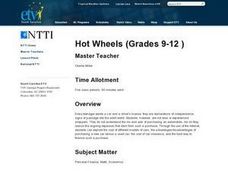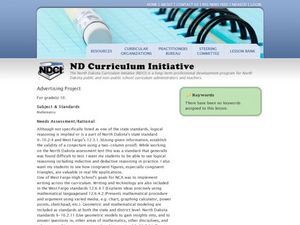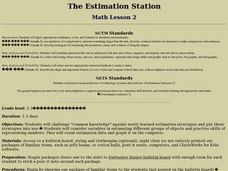Curated OER
An Exploration of the Slope of a Line
Students define the slope of a line. In this algebra instructional activity, students differentiate between parallel and perpendicular lines using their slopes. They rewrite equations in slope intercept form and explain the meaning of...
Curated OER
Global Warming Statistics
Students research real-time and historic temperature data of U.S. and world locations, and analyze the data using mean, median, and mode averages. They graph the data and draw conclusions by analyzing the data. A spreadsheet is used to...
Curated OER
The Six Faces of Garbage
Students use the mathematics of surface area to approach the problem of garbage pollution from the classroom. After watching a video, students construct replicas of cereal boxes and compute their surface area.
Curated OER
Let's Go To Mexico
Students are able to use the Internet to conduct research. They research Mexican culture and traditions. Students compare and contrast Mexican and U.S. food and clothing. They convert United States currency to Mexican pesos. Students...
Curated OER
Hot Wheels (Grades 9-12 )
Using internet research, young scholars compute the costs of different models of card. They discuss the advantages/disadvantages of purchasing a new car versus a used car, the cost of car insurance, and the best way to finance their...
Curated OER
Market Changes
Students explore the role of government in the economy market. In this economics instructional activity, students analyze the decision making and how it takes into consideration additional cost, benefits and public awareness of what they...
Curated OER
Deductive and Inductive Reasoning
Students differentiate between inductive and deductive reasoning. For this geometry lesson, students identify congruent figures and examine logos for congruency.
Curated OER
Analyze The Learner; Chocolate Fractions
Third graders describe, represent and compare fractions using pieces of a chocolate bar. For this fractions lesson, 3rd graders demonstrate how to read and write fractions correctly. Students then integrate technology by using...
Curated OER
Graph Club 2.0 Matching
Second graders study graphing using pictographs and bar graphs. They graph pie charts, line graphs, and also change the graph scale up to 1000. They use the pictograph on the left to create the same graph on the right using a bar graph.
Curated OER
Why People Trade
Young scholars explore the role of government in the economy market. In this economics lesson, students analyze the decision making and how it takes into consideration additional cost, benefits and public awareness of what they are...
Curated OER
Technobiz
Students examine candy preferences to create a plan in order to improve candy sales. In this technobiz instructional activity, students build spreadsheet and organizational skills by graphing and calculating data. Students are introduced...
Curated OER
Science: Let's Have a Cool Lunch
First graders develop problem-solving skills by designing methods for keeping lunch boxes cool. Once they determine the amount of sunlight and heat generated in shaded and unshaded areas, they explore ways to provide shade. Finally, 1st...
Curated OER
The Estimation Station
Students challenge "common knowledge" against newly learned estimation strategies and put those strategies into use. They consider variables in estimating different groups of objects and practice skills of representing numbers.
Curated OER
Quadratics and Graphing
Learners use the Nspire software to graph. In this algebra lesson, students graph quadratic equations using technology and graphs. They identify the maximum and minimum of each graph.
Curated OER
Pets Galore!
Fourth graders conduct a class survey on the number of pets that the 4th grade owns and they record that data in their math notebooks. They make a bar graph displaying the results using a spreadsheet through Microsoft Excel.
Curated OER
Patterns to the Rescue
Students watch "Cyberchase: The Poddleville Case" and analyze patterns. They complete a patterns assignment worksheet and then they make up patterns using numbers, shapes or colors, for their classmates to solve. They use patterns to...
Curated OER
The Quadratic Formula
Students complete math problems involving the quadratic formula. Using Internet technology, they visit web sites to answer questions about polynomials and the quadratic formula. Students explore the degree of a polynomial, the purpose of...
Curated OER
MAISA and the REMC Association of Michigan
Students complete online research to study geography's impact on weather. In this geography and weather lesson, students research weather in their city for ten days using an online website. Students bookmark the site, enter data into a...
Curated OER
On the Track With NASCAR
Students complete a variety of activities to research stock car racing. They use the Internet to research NASCAR acronyms, schedules, results, car design and other aspects.
Alabama Learning Exchange
Imaginary Numbers? What Do You Mean Imaginary?
Don't worry, this resource actually exists. Scholars learn about imaginary numbers and work on problems simplifying square roots of negative numbers. As an extension, they research the history of imaginary numbers.
Mathematics Assessment Project
Designing 3d Products: Candy Cartons
Wouldn't it be great to work in a candy factory? Learners get their chance as they first design a carton for a candy that meets certain requirements. They then examine and analyze nets and explanations in sample student responses.
Civil War Trust
Map the Civil War
Mapmaking was a very important element in successfully planning attacks on enemies during the Civil War. Guide pupils through the process of pacing to find the average length of their steps, measure the distance between one object...
Curated OER
Schools Going Solar
If your school has a photovoltaic system, you can use this lesson plan to guide learners through an investigation of the factors affecting performance. Familiarize yourself with the data acquisition system, and then provide data for your...
NASA
Just How Far is That Star?
Pupils often wonder how we know the distance to various stars. Starting with a thought experiment and progressing to a physical experiment, they determine the brightness and distance to various stars. The evaluation requires...

























